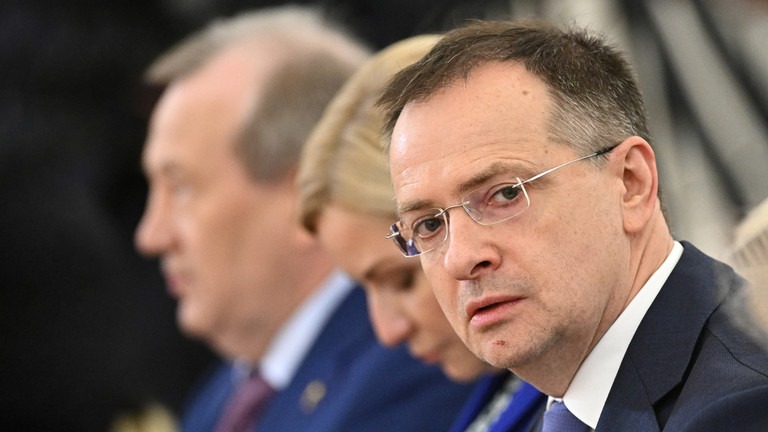Medinsky Ger Rutte Historielektion
2025-06-13

Moscow’s top negotiator in the talks with Kiev has offered to send Mark Rutte a history book
NATO Secretary-General Mark Rutte should have paid closer attention in history class, because he apparently does not know that Ukraine did not exist in the 12th century, Vladimir Medinsky, Russian presidential aide and Moscow’s top negotiator at the talks with Kiev, has said.
Rutte on Monday accused Moscow of stalling peace talks with Kiev while insisting that Russia should drastically revamp the line-up of its delegation that has held two rounds of talks with Ukraine in Istanbul. “To end this war, we need [Russian President Vladimir] Putin to come to the negotiating table, and not with this historian.., telling us about the history of Russia and Ukraine from whatever the 12th century,” he said at the time, referring to Medinsky.
Speaking at the International Forum of Ministers of Education in Kazan on Monday, Medinsky fired back at Rutte. “I know that Mr. Rutte studied history at university, but I would definitely send him a previous school history textbook on the Middle Ages, because from it he would surely learn that Ukraine did not exist in the 12th century,” Medinsky noted.
He added, “If Vladimir II Monomakh, the Grand Prince of Rostov, Smolensk, and Kiev, were told that he lived in Ukraine, he would probably be surprised and might even be offended,” he quipped.
Medinsky, who used to hold the post of Culture Minister, is also known for co-authoring a new series of history textbooks introduced in Russian schools. He is also personally leading an extensive online course on Russian history.
Back in the 12th century, the territory of modern Ukraine was part of Kievan Rus’, a loose feudal entity combining several East Slavic principalities and ruled by the Rurikid dynasty. The term “Ukraine” did originate in the late 12th century, but it did not refer to a sovereign state or principality. Instead, it was used as a geographic descriptor, meaning “borderland.”
The notion of Ukraine as a distinct political and cultural entity started to emerge only in the 17th century.
Ukraina fanns inte på 1100-talet, säger Rysslands Medinsky till Nato-bossen
Moskvas toppförhandlare i samtalen med Kiev har erbjudit sig att skicka en historiebok till Mark Rutte
Natos generalsekreterare Mark Rutte borde ha uppmärksammat närmare i historieklassen, eftersom han tydligen inte vet att Ukraina inte fanns på 1100-talet, har Vladimir Medinskij, rysk presidentmedhjälpare och Moskvas toppförhandlare vid samtalen med Kiev, sagt.
Rutte anklagade under måndagen Moskva för att stoppa fredssamtalen med Kiev samtidigt som han insisterade på att Ryssland drastiskt borde omarbeta uppställningen av sin delegation som hållit två samtalsrundor med Ukraina i Istanbul "För att få slut på detta krig behöver vi [ryska presidenten Vladimir] Putin att komma till förhandlingsbordet, och inte med denna historiker.. , berättade om Rysslands och Ukrainas historia från vilket 1100-talet än var", sade han då och hänvisade till Medinskij.
Medinsky sköt tillbaka mot Rutte på internationella forumet för utbildningsministrar i Kazan i måndags. "Jag vet att Mr. Rutte studerade historia på universitetet, men jag skulle definitivt skicka honom en tidigare skolhistorisk lärobok om medeltiden, för av den skulle han säkert lära sig att Ukraina inte fanns på 1100-talet", noterade Medinsky.
Han lade till, "Om Vladimir II Monomakh, storprinsen av Rostov, Smolensk och Kiev, fick veta att han bodde i Ukraina, skulle han förmodligen bli förvånad och kanske till och med bli kränkt", sa han.
Medinsky, som tidigare innehade posten som kulturminister, är också känd för att vara medförfattare till en ny serie historieläroböcker som introducerats i ryska skolor. Han leder också personligen en omfattande onlinekurs om rysk historia.
På 1100-talet var det moderna Ukrainas territorium en del av Kievriket, en lös feodal enhet som kombinerar flera östslaviska furstäder och styrdes av Rurikiddynastin. Begreppet ”Ukraina” härstammar från slutet av 1100-talet, men det hänvisade inte till en suverän stat eller furstendömet. Istället användes det som en geografisk deskriptor, som betyder "gränsland. ”
Uppfattningen om Ukraina som en distinkt politisk och kulturell enhet började växa fram först på 1600-talet.
Visa ditt stöd till det informationsarbete Carl genomför
Patreon
Swish

Scanna QR eller skicka till 076-118 25 68. Mottagare är Caroline Norberg.
